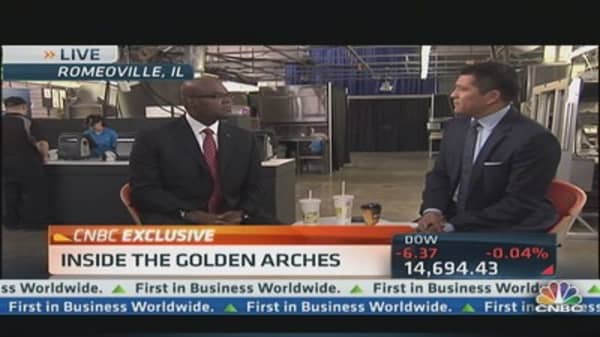Puzder quotes user ErickRast86, who says, "My angus deluxe was replaced by a quarter pounder with cheese deluxe, wthell man ... not even full #mcdonalds"
Tweeter TheRealAdamGee opines, ".@McDonalds why did you get rid of the angus third pounder? I'm sad, hungry, and want my money back! :("
Hoping to attract these unhappy customers, Hardee's and Carl's Jr. are offering a coupon at ReclaimYourAngus.com for their 100-percent Black Angus Beef Six Dollar Burgers. The burgers are actually $6 in name only and refer to the amount consumers would pay for the same type of sandwich at a casual-dining restaurant.
In response to the ad, McDonald's declined to speak via interview. In a statement, Danya Proud, a company spokeswoman, said: "We can confirm that McDonald's is removing the Angus Third-Pounder burgers from our national U.S. menu to make room for new and exciting choices including the new line of Quarter-Pounder flavors. We remain focused on our business and serving our customers and invite them to try the new line of QP (Quarter-Pounder) flavors which include: deluxe, bacon habanero ranch and bacon and cheese."
(Read More: Secret's Out! Hidden Restaurant Menu Items)
The Six Dollar Burgers' launch in 2002 prompted a wave of fast-food chains, including Burger King and McDonald's, to follow suit. Gradually though, the chains abandoned these pricier burgers.
"When McDonald's kind of pulled out of the field for competition for a restaurant-quality burger, we decided it was time to take advantage of that and let people know that the first major fast-food chain to have black Angus burgers still had them," Puzder said.
McDonald's decision to do away with the Third Pounder came down to wanting to give consumers more options and a burger that's less expensive than the Third Pounder, said Darren Tristano, executive vice president at Technomic, a market research firm.
"For most consumers, McDonald's price point makes McDonald's relevant," Tristano said. "When you start to get to that $7- or $8-dollar range, which is what an Angus burger, french fries and a beverage cost, you start to get outside of that."






